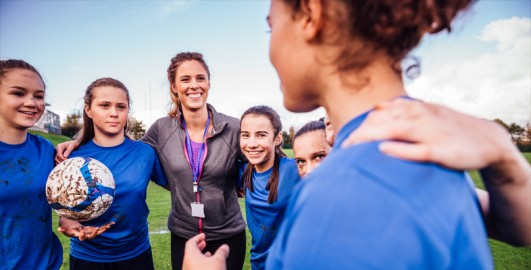Introduction
This course is designed to improve the knowledge and understanding for anyone working with neurodivergent athletes in sport and exercise settings or with an interest in coaching neurodiverse athletes. Within the sport and exercise sector this may include those in coaching roles, as well as fitness instructors, personal trainers and wider exercise professionals. Throughout this course when referring to neurodivergent athletes this will include athletes who may not be aware of a condition.
The course is divided into 4 weeks with approximately 2 hours of study allocated to each week. How and when you complete the content is entirely up to you. The first week provides a general introduction to neurodiversity with the three remaining weeks exploring neurodiversity from different perspectives within sport and exercise settings, and bringing this all together in the final week. The weeks are:
- What is neurodiversity?
- Neurodiversity in sport and exercise: an athlete’s voice
- Neurodiversity in sport and exercise: the family’s voice
- Supporting athletes in practice: creating a safe environment
Throughout the 4 weeks you will gain a unique insight into the lives of athletes, coaches and families to understand what it means to be neurodivergent and how this can influence participation and athletic development. You will apply theory to practice in a range of sport and exercise settings to begin to consider how you can shape your own coaching practice to support athletes with a neurodiverse condition. Although the audience is specifically those working or intending to work with neurodivergent athletes the course may also have some interest for others working with neurodiversity in different settings.
The content of the course is not designed to elicit difficult emotions in any way, but we recognise that sometimes covering emotive topics like this means some learners may be reminded of challenging past personal experiences, or experiences of those close to them. Identifying sources of support and self-care can be really useful for your wellbeing whether you are a coach, athlete or student, so you might want to do this at regular points during the course. If at any time you feel uncomfortable during the course try taking some time away, invest time in some self-care strategies, and return to the course when you feel comfortable
You may wish to download the OU Wellbeing App (on Android [Tip: hold Ctrl and click a link to open it in a new tab. (Hide tip)] or Apple) which contains a range of information, tools, resources and interactive support all about developing and monitoring good habits to maintain your wellbeing. The app will help you learn new techniques and methods to monitor your wellbeing progress over time.
By the end of this course, you should be able to:
- define neurodiversity and explain why it is significant in a sporting context
- describe different neurodiverse conditions and their potential impact on athletes
- consider how coaching practices can be tailored to meet the specific needs of neurodiverse athletes.
Moving around the course
In the ‘Summary’ at the end of each week, you will find a link to the next week. If at any time you want to return to the start of the course, click on ‘Full course description’. From here you can navigate to any part of the course.
It’s also good practice, if you access a link from within a course page, to open it in a new window or tab. That way you can easily return to where you’ve come from without having to use the back button on your browser.
You can now go to Week 1.
